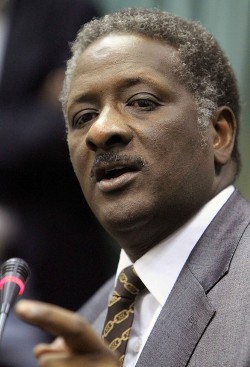Sudan finance minister says “huge” Chinese loan will stabilize economy as currency slides further
December 25, 2012 (KHARTOUM) – The Sudanese finance and national economy minister Ali Mahmood Abdel-Rasool disclosed that the country received a “huge” loan from China National Petroleum Corporation (CNPC).
 According to statements made by Abdel-Rasool to ‘Al-Mashhad Al-Aan’ newspaper and carried by Sudan news agency (SUNA), the loan will cause a “radical change” in the structure of the Sudanese economy.
According to statements made by Abdel-Rasool to ‘Al-Mashhad Al-Aan’ newspaper and carried by Sudan news agency (SUNA), the loan will cause a “radical change” in the structure of the Sudanese economy.
“This loan is good news for the people of Sudan as it will be reflected in the [form of an] increase in production and easing prices and [will] help stabilize the exchange rate of the Sudanese pound against other currencies,” the finance minister was quoted as saying.
Abdel-Rasool did not provide any details on the amount of the new loan or when a deal on it was sealed with CNPC but said that the Chinese oil company also agreed to extend maturity on previous loans by an extra five years.
Sudanese officials in the past have said that China suspended funding for several projects in Sudan because they needed oil as collateral.
South Sudan took with it three-quarters of the oil held by the previously united nation, but the processing and shipping facilities remained in Sudan.
Remarks by the minister comes amid confrontation with the labor union on the issue of raising wages and as the Sudanese pound traded at a new low against the dollar on the black market.
This is one of several statements made throughout this year by officials in the government and central bank about “large” deposits Sudan received from unnamed countries for unspecified amount.
In each instance the officials asserted that the new cash infusion will reverse the depreciation of the pound.
But the Sudanese pound continued to lose value against other currencies as individuals and businesses alike found it increasingly difficult to obtain dollars through official channels and sometimes even the black market.
With the loss of oil-rich south last year, Sudan’s main source of hard currency has dried up leaving the government scrambling to secure new sources of Forex.
“It is almost impossible to get dollars in Khartoum and it is getting worse,” one black market trader told Reuters. “The mood is very bad”.
On Tuesday, a dollar bought up to 7.1 pounds, breaching 7 for the first time. Last week, the rate on the parallel market, which has become the benchmark, was around 6.9. At the time of secession it was 3.3. The official rate currently stands at around 4.4.
In a sign of growing government concern that the exchange rate is spiraling out of control, the central bank said that they issued a nationwide ban on unofficial trading in hard currency.
The deputy governor of Sudan central bank Badr Al-Deen Mahmood was quoted by government sponsored Sudanese Media Center (SMC) website as telling parliament that the jump in the price of the dollar is a result of practices such as linking the dollar price to gold.
Mahmood said the bank is collecting information on currency dealers suggesting legal action might be forthcoming against those implicated.
He said that there is no excuse for trading outside the official channels as the central bank permits anyone to apply for a license to establish a Forex bureau.
The black market rate is watched by foreign firms which sell products in pounds but struggle to convert profits into dollars.
Among those companies are mobile service providers Zain and MTN and Gulf banks such as Dubai Islamic Bank.
The exchange rate also impacts the price of basic commodities most of which are imported from abroad. Inflation rate in November hit 47% last month.
(ST)
